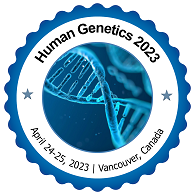Andoh Cletus Tandoh
University of Yaounde I, Cameroon
Title: GENOME EDITING AND HUMAN GENETIC DISEASES: NEW POSSIBILITIES AND CHALLENGES RELATED TO HEALTHCARE FOR AFRICA
Biography
Biography: Andoh Cletus Tandoh
Abstract
Currently, medical practice and approaches to healthcare delivery in Sub-Saharan Africa are increasingly obsolete and harmful to the vulnerable population afflicted with high disease burden. This requires new strategies and approaches to redress the situation and of putting plans into practice for integrating the often neglected genetic component and impact on our health and risk factors for diseases. The genetic basis of human diseases and disorders is poorly understood as human genetics and genomic medicine remain domains of study which are largely unexplored, under-researched, and under-funded in Africa. Meanwhile, developments in genome editing technologies and new scientific innovations offer new knowledge to advance the economic, health and political agendas, and approaches that can be used to reform medicine and transform healthcare delivery in Africa. Despite the advances, there is a huge persistent knowledge gap in understanding the connection between genetics, diseases and environmental factors, and how genes impact human health and risk to our lives. Further, much data is acquired from the mapping of the human genome on the genetic origins and cause of diseases, and evidence indicating that some monogenic diseases are cured using genome editing, but gene editing technologies are not yet applied to treat the genetic causes of diseases that run in families in Africa. Still, genetic diseases are life-threatening and leading causes of death, but not much is done to incorporate these components into medical practice and in healthcare delivery to improve health span, lifespan, and wellbeing in Africa. Most existing genetic data used in research is overwhelmingly from white people and the benefits of genomic medicine remain restricted to high-income countries. I address the knowledge gap and disparity in access to genomic medicine, and argue for a paradigm shift in the one size fits all approach to healthcare towards incorporation of precision medicine in Sub-Saharan Africa.

